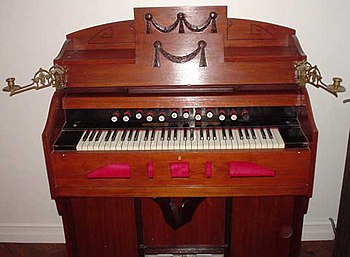 |
| A harmonium. Operation of the two large pedals at the bottom of the case supplies wind to the reeds. (Photo credit: Wikipedia) |
Description of the Harmonium
Harmoniums are in the family of free-reed aerophones. Harmoniums look like pipe organs, a rectangular-sized box with a key on the upper length. Each harmonium has a bellows at the back that is pumped with one hand while the other hand plays the keys. Inside they contain multiple compartments. There are different sections of free reeds in each compartment. The dimension of each reed in the bank produces a different pitch. Engaging Stops directs the pumped air to various compartments. Each playing Key and each Drone controls the air through the reeds within a compartment. When the Drones are engaged, they provide a lasting harmony note and are played in unison with the keyboard.
They used to be popular in churches and chapels where a pipe organ could not be used due to being too large or too expensive. Harmoniums are lighter than similarly-sized pianos and are not as easily damaged in transportation, thus they were also preffered throughout the colonies of the European powers in this period- not only because it was easier to ship the instrument out to where it was needed, but it was also easier to transport overland in areas where proper roads and railways were not existent.
The British introduced harmoniums to India during their ruling period. The instrument quickly became popular there: it was portable, reliable and easy to mater. Its popularity has increased to the present day, and the harmonium is an important instrument in many types of Indian music. It is commonly found in Indian homes. Though derived from the designs developed in France, the harmonium was developed further in India in unique ways, such as the addition of drone stops and a scale changing mechanism. A popular usage is by practitioners of different faiths, who use it in the devotional singing of prayers, called bhajan or kirtan.
There is at least one harmonium in any mandir (Hindu temple) around the world. The harmonium is also commonly accompanied by a drum known as the tabla or by the mridanga. Many Hare Krishna devotees have mastered this instrument and offer their services by playing beautiful music during the kirtana services and ceremonies at the temples.
Victor Epand is an expert consultant for Krishna art, religious gifts from India, and Hare Krishna books. Article Source: EzineArticles |

No comments:
Post a Comment